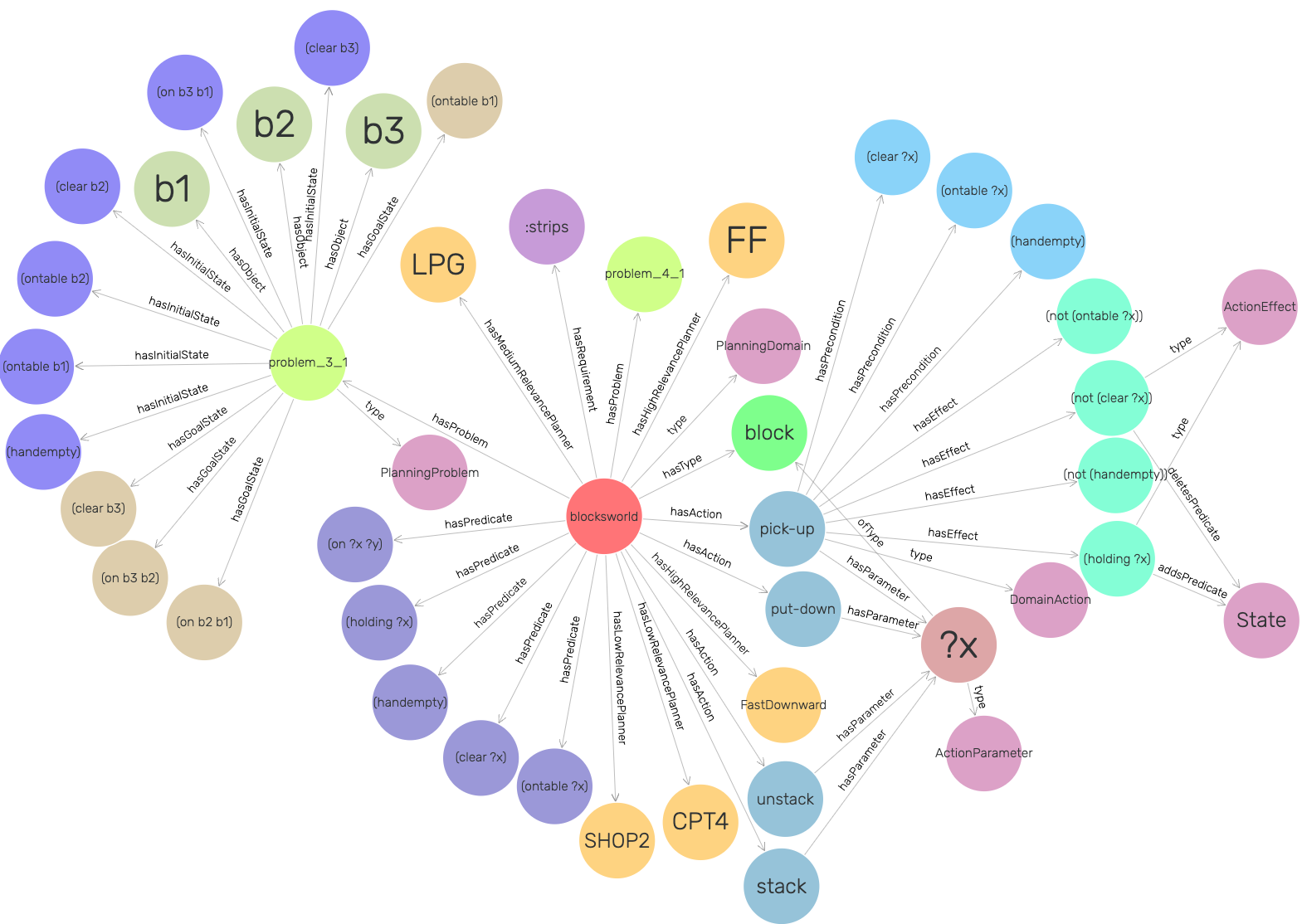Example of Competency Questions
For the evaluation of the competency questions, we have considered a sample knowledge graph, shown in Figure 2, for blocksworld from IPC-2000 domain created using planning ontology shown in Figure 1.
| Example Competency Question | Description |
|---|---|
| (Q1). What are the different types of planners used in automated planning? | Identifies and lists the various types of planners utilized in the field of automated planning. |
| (Q2). What is the relevance of a planner in a given problem domain? | Explores the importance and applicability of different planners within a specific problem domain. |
| (Q3). What are the available actions for a given domain? | Provides a list of actions that can be performed within a specified domain. |
| (Q4). What problems in a domain satisfy a given condition? | Identifies problems within a domain that meet certain specified conditions. |
| (Q5). What are all requirements a given domain has? | Enumerates all the prerequisites or conditions necessary within a particular domain. |
| (Q6). What is the cost associated with generating a plan for a given problem? | Determines the cost involved in creating a plan to solve a specified problem. |
| (Q7). How many parameters does a specific action have? | Counts the number of parameters required for a particular action within a domain. |
| (Q8). What planning type a specific planner belongs to? | Classifies a given planner into its respective planning type. |
| (Q9). What requirements does a given planner support? | Lists the requirements that a specific planner is capable of addressing. |
| (Q10). What are the different parameter types present in a domain? | Identifies and lists the various types of parameters present within a specified domain. |

SPARQL Queries
- What are the different types of planners used in automated planning?
PREFIX plan-ontology: <https://purl.org/ai4s/ontology/planning#> PREFIX rdfs: <http://www.w3.org/2000/01/rdf-schema#> SELECT DISTINCT ?planner WHERE { ?planner a plan-ontology:planner. } - What is the relevance of a planner in a given problem domain?
PREFIX plan-ontology: <https://purl.org/ai4s/ontology/planning#> PREFIX rdfs: <http://www.w3.org/2000/01/rdf-schema#> SELECT DISTINCT ?domain ?relevance ?planner WHERE { ?domain a plan-ontology:domain; rdfs:label "caldera". ?planner a plan-ontology:planner. ?domain ?relevance ?planner. } - What are the available actions for a given domain?
PREFIX plan-ontology: <https://purl.org/ai4s/ontology/planning#> PREFIX rdfs: <http://www.w3.org/2000/01/rdf-schema#> SELECT DISTINCT ?domain ?action WHERE { ?domain a plan-ontology:domain; rdfs:label "caldera". ?domain plan-ontology:hasMove ?action. } - What problems in a domain satisfy a given condition?
PREFIX plan-ontology: <https://purl.org/ai4s/ontology/planning#> PREFIX rdfs: <http://www.w3.org/2000/01/rdf-schema#> SELECT DISTINCT ?problem WHERE { ?domain a plan-ontology:domain; rdfs:label "caldera". ?problem a plan-ontology:problem. ?domain plan-ontology:hasProblem ?problem. ?problem plan-ontology:hasGoalState ?condition. FILTER(?condition = "specified_condition") } - What are all requirements a given domain has?
PREFIX plan-ontology: <https://purl.org/ai4s/ontology/planning#> PREFIX rdfs: <http://www.w3.org/2000/01/rdf-schema#> SELECT DISTINCT ?domain ?requirement WHERE { ?domain a plan-ontology:domain; rdfs:label "caldera". ?domain plan-ontology:hasRequirement ?requirement. } - What is the cost associated with generating a plan for a given problem?
PREFIX plan-ontology: <https://purl.org/ai4s/ontology/planning#> PREFIX rdfs: <http://www.w3.org/2000/01/rdf-schema#> SELECT DISTINCT ?plan ?cost WHERE { ?problem a plan-ontology:problem; rdfs:label "problem-01". ?problem plan-ontology:hasPlan ?plan. ?plan plan-ontology:hasCost ?cost. } - How many parameters does a specific action have?
PREFIX plan-ontology: <https://purl.org/ai4s/ontology/planning#> PREFIX rdfs: <http://www.w3.org/2000/01/rdf-schema#> SELECT (COUNT(?parameter) AS ?parameterCount) WHERE { ?action a plan-ontology:action; rdfs:label "get_domain". # action of domain caldera ?action plan-ontology:hasParameter ?parameter. } - What planning type a specific planner belongs to?
PREFIX plan-ontology: <https://purl.org/ai4s/ontology/planning#> PREFIX rdfs: <http://www.w3.org/2000/01/rdf-schema#> SELECT DISTINCT ?planner ?planningType WHERE { ?planner a plan-ontology:planner; rdfs:label "Delfi1". ?planner plan-ontology:ofPlannerType ?planningType. } - What requirements does a given planner support?
PREFIX plan-ontology: <https://purl.org/ai4s/ontology/planning#> PREFIX rdfs: <http://www.w3.org/2000/01/rdf-schema#> SELECT DISTINCT ?planner ?requirement WHERE { ?planner a plan-ontology:planner; rdfs:label "Delfi1". ?planner plan-ontology:solvesRequirement ?requirement. } - What are the different parameter types present in a domain?
PREFIX plan-ontology: <https://purl.org/ai4s/ontology/planning#> PREFIX rdfs: <http://www.w3.org/2000/01/rdf-schema#> SELECT DISTINCT ?domain ?parameterType WHERE { ?domain a plan-ontology:domain; rdfs:label "caldera". ?domain plan-ontology:hasParameterType ?parameterType. }